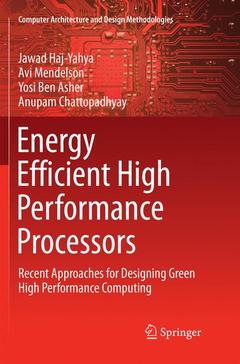Description
Energy Efficient High Performance Processors, 1st ed. 2018
Recent Approaches for Designing Green High Performance Computing
Computer Architecture and Design Methodologies Series
Authors: Haj-Yahya Jawad, Mendelson Avi, Ben Asher Yosi, Chattopadhyay Anupam
Language: English
Subject for Energy Efficient High Performance Processors:
126.59 €
In Print (Delivery period: 15 days).
Add to cart
Energy Efficient High Performance Processors
Publication date: 01-2019
Support: Print on demand
Publication date: 01-2019
Support: Print on demand
126.59 €
In Print (Delivery period: 15 days).
Add to cart
Energy Efficient High Performance Processors
Publication date: 04-2018
Support: Print on demand
Publication date: 04-2018
Support: Print on demand
Description
/li>Contents
/li>Biography
/li>Comment
/li>
This book explores energy efficiency techniques for high-performance computing (HPC) systems using power-management methods. Adopting a step-by-step approach, it describes power-management flows, algorithms and mechanism that are employed in modern processors such as Intel Sandy Bridge, Haswell, Skylake and other architectures (e.g. ARM). Further, it includes practical examples and recent studies demonstrating how modem processors dynamically manage wide power ranges, from a few milliwatts in the lowest idle power state, to tens of watts in turbo state. Moreover, the book explains how thermal and power deliveries are managed in the context this huge power range.
The book also discusses the different metrics for energy efficiency, presents several methods and applications of the power and energy estimation, and shows how by using innovative power estimation methods and new algorithms modern processors are able to optimize metrics such as power, energy, and performance. Different power estimation tools are presented, including tools that break down the power consumption of modern processors at sub-processor core/thread granularity. The book also investigates software, firmware and hardware coordination methods of reducing power consumption, for example a compiler-assisted power management method to overcome power excursions. Lastly, it examines firmware algorithms for dynamic cache resizing and dynamic voltage and frequency scaling (DVFS) for memory sub-systems.
Introduction.- Background.- DOEE: Dynamic Optimization framework for better Energy Efficiency.- Fine-grain Power Breakdown of Modern Out-Of-Order Cores and its implications on Skylake based systems.- Compiler-Directed Power Management for Superscalars.- SEEM: Symbolic Execution for Energy Modeling.- Related Works.- Conclusions and Future Work.
Jawad Haj-Yahya received his BSc degree in Computer Science from Technion – Israel Institute of Technology, and his MSc and PhD degrees in Computer Science from the University of Haifa. Jawad worked as a power management architect for high-performance processors (Sandy Bridge, Haswell, Skylake, etc) in the Processors’ Architecture group at the Intel Corporation for 13 years. Jawad’s honors include the Intel Achievement Award (IAA), which is the highest award at Intel. His research interests include energy aware computing, power estimation and applications, and low power IC design. Recently Jawad has joined Nanyang Technology University at Singapore as a cyber security research scientist.
Prof. Avi Mendelson has a blend of industrial and academic experience in several different areas, such as computer architecture, operating systems, power management, reliability, high-performance computing and hardware security. He received his PhD from the ECE Department, University of Massachusetts at Amherst (UMASS) in 1990 and his BSc and MSc degrees from the Computer Science Department, Technion. He was the manager of the academic outreach program at Microsoft R&D Israel, where he initiated various innovation-based activities for students. Before that, he worked for 11 years as a senior researcher and principal engineer at Intel. Among his achievements at Intel, he was the chief architect of the CMP (multicore-on-chip) feature of the first dual-core processors Intel developed, for which he received the Intel Achievement Award (the highest award at Intel). Mendelson has published more than 130 papers in refereed journals, and at conferences and workshops. He completed a full term as an associate editor of IEEE Computer Architecture Letters (CAL) and now serves as an associate editor of IEEE Transactions on Computers.
He served as program chair of a number of major conferences and as the general chair of the ISCA
Maximizes readers’ insights into the power management of modern high-performance processors for energy efficiency Shares numerous tips for designing robust and scalable power management subsystems for modern system on a chip Includes a chapter that outlines compiler-assisted methods for power management using modern LLVM compilers with software, firmware, and hardware coordination methods
© 2024 LAVOISIER S.A.S.




